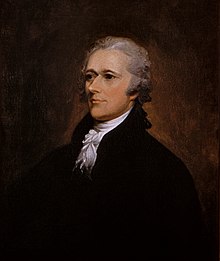Alexander Hamilton
| Alexander Hamilton | |
|---|---|

Portrait of Alexander Hamilton by John Trumbull, 1806
|
|
| 1st United States Secretary of the Treasury | |
|
In office September 11, 1789 – January 31, 1795 |
|
| President | George Washington |
| Preceded by | Position established |
| Succeeded by | Oliver Wolcott, Jr. |
| Senior Officer of the Army | |
|
In office December 14, 1799 – June 15, 1800 |
|
| President | John Adams |
| Preceded by | George Washington |
| Succeeded by | James Wilkinson |
| Delegate to the Congress of the Confederation from New York |
|
|
In office November 3, 1788 – March 2, 1789 |
|
| Preceded by | Egbert Benson |
| Succeeded by | Seat abolished |
|
In office November 4, 1782 – June 21, 1783 |
|
| Preceded by | Seat established |
| Succeeded by | Seat abolished |
| Personal details | |
| Born |
January 11, 1757 Charlestown, Nevis, British West Indies |
| Died | July 12, 1804 (aged 47) New York City, U.S. |
| Political party | Federalist |
| Spouse(s) | Elizabeth Schuyler |
| Children | Philip, Angelica, Alexander, Jr., James, John, William, Eliza, and Philip |
| Alma mater | Kings College, New York (Columbia University) |
| Religion | Presbyterian, Episcopalian (convert) |
| Signature | |
| Military service | |
| Allegiance |
|
| Service/branch |
|
| Years of service | 1775–1776 (Militia) 1776–1781 1798–1800 |
| Rank | |
| Battles/wars |
American Revolutionary War • Battle of Harlem Heights • Battle of White Plains • Battle of Trenton • Battle of Princeton • Battle of Brandywine • Battle of Germantown • Battle of Monmouth • Siege of Yorktown Quasi-War |
Alexander Hamilton (January 11, 1755 or 1757 – July 12, 1804) was an American statesman and one of the Founding Fathers of the United States. He was an influential interpreter and promoter of the U.S. Constitution, as well as the founder of the nation's financial system, the Federalist Party, the United States Coast Guard, and The New York Post newspaper. As the first Secretary of the Treasury, Hamilton was the main author of the economic policies of the George Washington administration. He took the lead in the funding of the states' debts by the Federal government, as well as the establishment of a national bank, a system of tariffs, and friendly trade relations with Britain. His vision included a strong central government led by a vigorous executive branch, a strong commercial economy, with a national bank and support for manufacturing, plus a strong military. This was challenged by Virginia agrarians Thomas Jefferson and James Madison who formed a rival party. They favored strong states based in rural America and protected by state militias as opposed to a strong national army and navy. They denounced Hamilton as too friendly toward Britain and toward monarchy in general, and too oriented toward cities, business and banking.
...
Wikipedia
